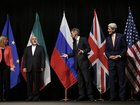Arab League chief Nabil al-Arabi said Wednesday a historic nuclear deal between Iran and world powers is a first step to ridding the Middle East of weapons of mass destruction.
The head of the Cairo-based pan-Arab bloc expressed hopes the accord reached on Tuesday would usher in "stability and security" in the volatile region.
 Full Story
Full Story
British Foreign Secretary Philip Hammond said he was heading to Israel later Wednesday to explain the Iran nuclear deal in person and voiced hope Britain could reopen its embassy in Tehran this year.
Briefing parliament about the agreement unveiled on Tuesday, Hammond said he would speak to Israeli Prime Minister Benjamin Netanyahu on Thursday "to convey our message about this deal directly".
 Full Story
Full Story
Israeli Prime Minister Benjamin Netanyahu suffered a major defeat in failing to stop a nuclear deal with Iran but he remains as defiant as ever even at the risk of further isolation.
While the world's major powers welcomed the deal finalized with Iran on Tuesday as a historic moment capable of setting relations with the Islamic republic on a new path, Netanyahu harshly condemned it.
 Full Story
Full Story
Lebanese politicians had on Wednesday mixed reactions to a historic accord struck a day earlier by Iran, the United States, and five other world powers to check Tehran's nuclear efforts short of building a bomb.
Free Patriotic Movement leader MP Michel Aoun said the deal could have a positive impact on Lebanon's presidential elections. But stressed that granting Christians their rights cannot be influenced by any change in the world.
 Full Story
Full Story
U.S. President Barack Obama told a skeptical Benjamin Netanyahu Tuesday that the freshly sealed Iran nuclear deal was in Israel's national interest and dispatched his secretary of defense to the Jewish state for talks.
The White House said Obama called the Israeli Prime Minister, who has described the accord as a "historic mistake," announcing Ash Carter would travel to Israel next week.
 Full Story
Full Story
Prime Minister Benjamin Netanyahu said Tuesday after world powers reached a historic nuclear deal with Iran that Israel was not bound by it and signaled he remained ready to order military action.
Netanyahu's harsh criticism of the agreement came after he warned for months that the deal being negotiated would not prevent Iran from acquiring nuclear weapons.
 Full Story
Full Story
Getting the Iran nuclear deal unveiled Tuesday was hard enough. Now it must be approved, implemented and then stuck to for years. Get set for a bumpy ride, experts warn.
"This agreement is as fragile as the forces against it are formidable. It has serious critics in Iran, the U.S. and the region," said Ali Vaez from the International Crisis Group thinktank.
 Full Story
Full Story
To critics, lifting sanctions on Iran under an historic deal reached Tuesday will help its ability to foment unrest in the Middle East, but some experts say the nuclear issue has become a sideshow to more immediate crises in the region.
After years of negotiations, climaxing in an 18-day marathon in Vienna, world powers secured a deal with Tehran aimed at ensuring Iran does not obtain the nuclear bomb.
 Full Story
Full Story
U.S. President Barack Obama lauded a landmark nuclear agreement with Iran as vindication of his diplomatic approach and a chance for a "new direction" in decades of vexed relations with Tehran.
Obama said the deal -- which would curb Iran's nuclear program in return for substantial international sanctions relief -- cut off "every pathway" to an Iranian atomic weapon.
 Full Story
Full Story
Israel has vehemently opposed a nuclear deal with Iran and repeatedly threatened strikes against the Islamic republic, but it must now learn to live with the accord accepted by the world's major powers, analysts say.
Israeli Prime Minister Benjamin Netanyahu evoked frightening scenarios during the months the deal was being negotiated, arguing the agreement would not block Iran's path to nuclear weapons.
 Full Story
Full Story



